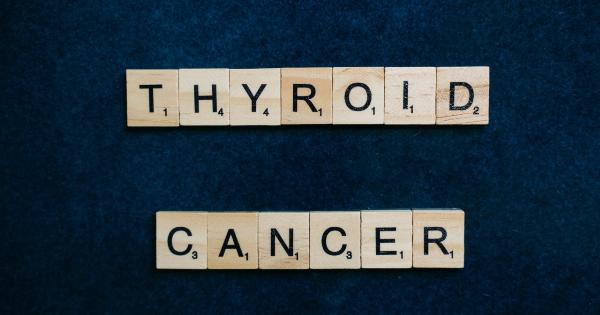Thyroid cancer is a type of cancer that begins in the cells of the thyroid gland. The thyroid gland is located in the front of your neck and is responsible for producing hormones that regulate various bodily functions.
When abnormal cells in the thyroid gland start to grow and divide uncontrollably, they can form a tumor, leading to thyroid cancer.
Types of Thyroid Cancer
There are several types of thyroid cancer, including:.
Papillary Thyroid Cancer
Papillary thyroid cancer is the most common type, accounting for about 80% of all thyroid cancer cases. It usually develops in one lobe of the thyroid gland and often spreads to the lymph nodes in the neck.
Papillary thyroid cancer tends to grow slowly and has a high cure rate.
Follicular Thyroid Cancer
Follicular thyroid cancer is the second most common type, making up about 10-15% of all cases. It usually occurs in older adults and can spread to other parts of the body, such as the lungs and bones.
Medullary Thyroid Cancer
Medullary thyroid cancer accounts for around 4% of thyroid cancer cases. It develops in the C cells of the thyroid gland, which produce a hormone called calcitonin. Medullary thyroid cancer can run in families and is often linked to genetic mutations.
Anaplastic Thyroid Cancer
Anaplastic thyroid cancer is the most aggressive and rarest form of thyroid cancer. It accounts for less than 2% of cases but spreads quickly to nearby tissues and organs. Anaplastic thyroid cancer is difficult to treat and has a low survival rate.
Causes and Risk Factors
The exact cause of thyroid cancer is unknown, but several factors can increase the risk of developing the disease. These include:.
Family History
Having a first-degree relative, such as a parent or sibling, with thyroid cancer can increase your risk. Certain inherited genetic mutations, such as in the RET gene, are associated with an increased likelihood of developing medullary thyroid cancer.
Exposure to Radiation
Exposure to high levels of radiation, particularly during childhood, increases the risk of developing thyroid cancer.
This exposure can come from various sources, including radiation therapy for the head and neck area, nuclear accidents, or radiation treatment received in infancy for conditions like enlarged thymus or acne.
Gender
Thyroid cancer is more common in females than males. The reasons behind this difference are not fully understood, but hormonal factors may play a role.
Age
Thyroid cancer can occur at any age, but it is more common in people over the age of 30. Different types of thyroid cancer tend to affect different age groups, with papillary thyroid cancer being more prevalent in younger individuals.
Thyroid Nodules
Thyroid nodules are abnormal growths or lumps that form within the thyroid gland. While the majority of thyroid nodules are noncancerous (benign), some can be cancerous.
Having a larger thyroid nodule or multiple nodules increases the chance of developing thyroid cancer.
Iodine Deficiency or Excess
Iodine is an essential nutrient required for the production of thyroid hormones. Both iodine deficiency and excess can be risk factors for thyroid cancer.
However, the relationship between iodine intake and thyroid cancer is complex and varies in different parts of the world.
Symptoms
In the early stages, thyroid cancer may not cause any noticeable symptoms. As the tumor grows, some common symptoms may include:.
Lump or Swelling in the Neck
A visible lump or swelling in the neck, often in the front just below the Adam’s apple, is a common symptom of thyroid cancer. This lump may gradually increase in size over time.
Hoarseness or Voice Changes
Cancerous cells growing near or affecting the vocal cords can cause hoarseness or other changes in the voice.
Difficulty Swallowing or Breathing
Thyroid cancer may cause compression or invasion of nearby structures, leading to difficulty swallowing or breathing.
Persistent Cough
A persistent cough that is not related to a common respiratory infection or allergy could be a symptom of thyroid cancer.
Pain in the Neck or Throat
Some individuals with thyroid cancer may experience pain or discomfort in the neck or throat area.
Unexplained Weight Loss or Gain
Unexplained weight loss or gain, unrelated to changes in diet or exercise, can sometimes be an early sign of thyroid cancer.
Diagnosis
If you experience any of the symptoms associated with thyroid cancer or have risk factors, it is important to see a healthcare professional for an evaluation. The following tests may be conducted to diagnose thyroid cancer:.
Physical Examination
A healthcare provider will perform a physical examination, feeling for any lumps or abnormalities in the neck area, checking for swollen lymph nodes, and assessing your overall health.
Ultrasound
An ultrasound uses sound waves to create images of the thyroid gland. It helps identify the size and characteristics of any nodules or tumors present.
Biopsy
A biopsy involves removing a small sample of tissue from the thyroid gland for examination under a microscope. This procedure helps determine if the cells are cancerous or noncancerous.
Blood Tests
Blood tests may be performed to measure the levels of thyroid hormones and certain proteins in the blood that can indicate the presence of thyroid cancer.
Imaging Tests
Additional imaging tests such as computed tomography (CT) scans, magnetic resonance imaging (MRI), or positron emission tomography (PET) scans may be recommended to assess the extent of cancer spread.
Treatment
The treatment approach for thyroid cancer depends on various factors, including the type and stage of the cancer, as well as the individual’s overall health. Common treatment options for thyroid cancer include:.
Surgery
The most common treatment for thyroid cancer is surgery to remove the tumor and, in some cases, the entire thyroid gland. The extent of surgery required depends on the type and stage of cancer.
Radioactive Iodine Therapy
After surgery, radioactive iodine therapy may be recommended to destroy any remaining thyroid tissue or cancer cells. This treatment is often used for papillary or follicular thyroid cancer.
External Beam Radiation
External beam radiation therapy involves directing high-energy radiation beams at the area affected by cancer. It is typically reserved for cases where thyroid cancer has spread to nearby tissues or lymph nodes.
Chemotherapy
Chemotherapy uses drugs to kill cancer cells. While it is not commonly used for most types of thyroid cancer, it may be recommended for advanced or aggressive cases.
Targeted Therapy
Targeted therapy drugs are designed to specifically target and attack cancer cells. These medications are sometimes used for advanced cases of thyroid cancer that do not respond to other treatments.
Prevention and Early Detection
While it may not be possible to prevent thyroid cancer entirely, there are steps you can take to lower your risk or detect it early:.
Self-Examination
Perform regular self-examinations by gently feeling your neck for any lumps or swelling.
Regular Check-ups
See your healthcare provider for routine check-ups and discuss any concerns or symptoms you may have.
Protect Against Radiation
Avoid unnecessary exposure to radiation and protect your neck area during medical procedures that involve radiation, especially if you have an increased risk.
Healthy Lifestyle
Adopting a healthy lifestyle, including a balanced diet, regular exercise, and avoiding excessive alcohol consumption, may help reduce the risk of various types of cancer.
Know Your Family History
Be aware of your family’s medical history, particularly when it comes to thyroid cancer or other related conditions.
Conclusion
Thyroid cancer is a complex disease that can have different types, causes, and treatment approaches.
Understanding the risk factors, signs, and symptoms, as well as seeking medical attention for timely diagnosis and treatment, are crucial steps in managing thyroid cancer. By being proactive and informed, you can take necessary precautions and potentially improve outcomes if diagnosed with thyroid cancer.




























